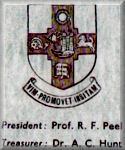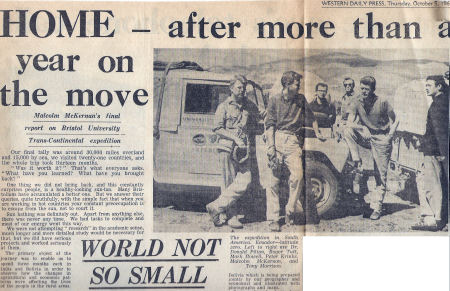University
of Bristol Trans-Continental Expedition 1960 — 61 | ||||||||
| ||||||||
| published 20 October 1961 | ||||||||
Our final tally was around 30,000 overland and 15,000 by sea, we visited twenty-one countries, and the whole trip took thirteen months. "Was it worth it?" That's what everyone asks. "What have you learned? What have you brought back?" One thing we did not bring back, and this constantly surprises people, is a healthy- looking sun-tan. Many Bristolians have accumulated a better one. But we answer their queries, quite truthfully, with the simple fact that when you are working in hot countries your constant preoccupation is to escape from the sun, not to court it. Sun bathing was definitely out. Apart from anything else, there was never any time. We had tasks to complete and most of our energy went this way. We were not attempting "research" in the academic sense, much longer and more detailed study would be necessary for that, but we did have serious projects and worked seriously at them. The primary object of the journey was to enable us to spend three months each in India and Bolivia in order to observe how the changes in agricultural and economic patterns were affecting the lives of the people in the rural areas. Obvious limits Three months is a short enough period, particularly when there are language troubles, so in India we decided to restrict our observations to one small area. This meant that we studied a small group of a thousand people out of a population of several hundred million; the limitations are obvious. But such was the co-operation we received that we were very pleased with the results; in fact we managed to see more than we had dared to hope. The people of our area, from Government officials to the poorest peasant, knew of our visit and were waiting for us. Plans were made on our behalf; itineraries were worked out and visits arranged. They were proud of the work they were doing and were determined that we should see it all; and there proved to be a lot to see. A smaller group could not have covered it. So we visited model farms where new agricultural techniques are being demonstrated and village co-operatives where the lesson is one of working together. We looked at things purely rural, and also toured the three large industrial concerns of the district (pumps, agricultural implements and glassware) and discussed with the management the effect of such factories on the lives of the villagers. We also saw attempts to start small village industries which could mean an added source of income for the families on their own doorstep. We made many friends, particularly among the teachers and officials who gave up much of their time to answer our questions and to act as interpreters. India was all that we had dared to hope - and more. The strangeness is somehow expected but this expectation cannot spoil the fascination of the climate and the colour, the problems and the devoted attempts being made towards their solution. Nor the friendliness of the people. Everyone was determined to make us feel at home - even though they were proud that Indian was now their home in the complete sense. Any mention of the days of the British rule was made with the most remarkable detachment and absence of acrimony. They have retained those things they considered good (for example the Judicial System and the Civil Service) and alongside them have introduced new measures and systems to fight their own particular problems. Huge delight My two best memories of India are both of group occasions. One is the intent concentration of the men who crowded a small whitewashed room where were were recording a young flute-player; outside canned entertainment was being provided by the annual fair but here were teachers and farmers nodding appreciation and understanding of the old, classical music being created for them. The other is of a banquet provided for us by the Peasant Co-operative - a thing they could hardly afford to do. My ankles remember the torture of sitting cross legged on the floor, my stomach the difficulty of some of the dishes. But more important were the happy innocent smiles of our hosts which reflected their pride that we had come to their village and their great delight at being able to entertain us. In Bolivia our work was rather different and not so concentrated. The Andean Mission of the United Nations is doing work, similar to that in India, on farming methods and the value of co-operation; and is shewing the peasants how to build better houses and to take precaution against disease Terrible roads The distribution of population is extremely uneven and unfortunate. The high Altiplano is densely populated but unproductive (too little rain and too much wind and frost), yet the potentially rich eastern lowlands have too few people. The Bolivian Government has several colonisation projects, moving the people from the high lands to the low; there are also several colonies of Japanese and Okinawans. Communications are the greatest problem. This is true, probably of all South American countries, but is more serious where the Andes cut off one part of a country from another, as in Bolivia, Peru, Ecuador and Colombia. Roads are deplorable and it is extremely difficult to transport products from the fertile regions to the mining areas and cities. Thus much food is imported unnecessarily and is another drain on an already wilting economy. In visiting these different areas of the country we passed through all the major cities and were able to learn much more about the overall economic position than has been possible in India. One
of the proposed publications of the Expedition is a small book on contemporary Brave attempts have been made in Bolivia over the past nine years to remedy some of the injustices of colonial government and rule by local oligarchies which succeeded it. The government now accepts responsibility for all the citizens instead of ten or fifteen per cent; land titles have been given to those who actually work it, votes have been given to all over eighteen irrespective of colour, race or educational level, and schools have been built where previously the need had not been admitted. Many memories These reforms have in turn created their own problems and the position is not so stable as could be desired. But they have been achieved without recourse to totalitarian communism, and the study of them shows how similar, and equally necessary, changes could be promoted in other South American countries. These two study periods account for roughly half our time away, the rest has been spent travelling. Naturally we have learned much less about the countries that we merely passed through, although we all have personal memories. The austere strength and remoteness of the mountains of Afghanistan which was reflected in the calm dignity of the villagers, whose proud aspect belied their courteous hospitality. Drained faces Or a contrast, extraordinary New York - surely the city of the obvious immediate comparisons, where wealth and power are literally just across the street or down the block from poverty and failure, where the vast impersonal creations of man dwarf their creators, and where the hurrying crowds show far too many drained and empty faces of people who have lost the battle with their own ambition. When asked which country we would most like to return to, the members of the Expedition generally say India, perhaps because there is so much of that country we had no time to see. Almost all the countries produced desires for a more leisurely second look and we have our notes, films and photographs to remind and tantalise us. We hope that by showing these we can pass on to other people some of the small knowledge we have been fortunate enough to gain of these countries. But more is our enthusiasm for gaining it, and the belief that any new understanding, however, slight, must have a great value in the world where, as never before, man can travel far and see nothing. Ostrich-like The cliche "it's a small world" has developed the power of a paradox; for it is only cities that have been brought closer together, and they were always spiritually linked. The vast speed with which we now travel from point to point merely makes the intervening, untouched areas seem more remote; the traveller can fly thousands of miles in a day, passing carelessly over millions of people of whose thoughts, feelings, desires and needs he knows nothing. This is a dangerous ignorance Ostrich-like, we hide our heads in the clouds and our ambitions in outer space, while our own earth is vibrating with old injustices and new hopes. We should do more to understand them.
| ||||||||
|


 The
distances we covered
The
distances we covered